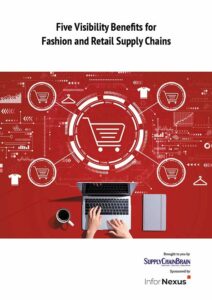
The holiday season can bring joy and festivities worldwide, but it also presents unique challenges for businesses with complex supply chains. Recent news about counterfeit airplane parts disrupting the aviation industry and recalls of ingredients for holiday-themed foods may seem unrelated, but they both shed light on a company’s reliability on suppliers and the critical need for transparency and visibility to avoid supplier misconduct — which can result in significant holiday disruption. As consumers gear up for holiday shopping and travel, the risks posed by counterfeit products and unethical practices in the supply chain can impact a company’s bottom line.
Today’s global economy relies on networks of contractors and subcontractors who together help develop and deliver parts and products that form an integral part of our everyday lives. That includes manufacturing components for the planes we fly, and food production that contributes billions of dollars to the holiday season. The economic impact of holiday shopping, food, and travel during Christmas is substantial. In fact, in 2023, total holiday sales are projected to reach $957 billion.
No matter the industry, an association with unethical suppliers can damage a company’s reputation and, worse, lead to long-term financial, regulatory, or consumer safety impacts. When supply chain misconduct occurs, it not only creates disruption, but jeopardizes trust with consumers, partners, and investors, with far-reaching consequences.
As Warren Buffett stated, “It takes 20 years to build a reputation and five minutes to ruin it.” This adage holds true for businesses, especially when revenue and safety are at stake during the busiest time of the year.
How can business leaders mitigate (or protect against) such risks? The answer can be found in one of the most unexpected places — contracts.
AI and Commercial Relationships
Contracts are the foundation of commerce. They govern dollars in and out of the enterprise, determining what goods and services are provided, where they are sourced, and how much companies are charged for them. However, the manual processing of large volumes of complex contracts can mean that critical obligations agreed upon are not properly tracked, managed, or enforced. For example, legal and procurement teams are responsible for overseeing contract creation and approvals, surfacing cost savings, avoiding missed obligations, and ensuring ongoing compliance throughout the supplier relationship. This can be challenging when managing thousands of commercial contracts.
By digitizing supplier agreements and adopting AI technology to analyze critical enterprise-wide contract data and gain insights into supplier practices, companies can identify red flags and deviations from compliance standards, ensuring safety and ethical behavior across the entire supplier ecosystem. Such contract intelligence — a new approach to traditional contract management — enables businesses to improve their supplier relationships across the enterprise and stay informed about activities further down the supply chain.
Here are four ways AI empowers businesses to proactively manage risks and maintain ethical standards throughout the supply chain this holiday season:
AI streamlines due diligence processes by automating the evaluation of supplier credentials, certifications, and compliance history — ensuring the selection of ethical and reliable partners. Natural language processing (NLP), machine learning, and data analytics work together to improve accuracy, surface relevant information in contracts, and automate the contract generation process, reducing the time and effort required for manual review and drafting.
AI enhances visibility and transparency into supplier relationships by facilitating proactive and real-time monitoring of supplier activities and performance. Machine learning algorithms analyze contract terms and conditions and identify potential risks, such as unfavorable clauses that might indicate or allow for unethical practices. Alerts are generated when there are deviations from industry standards, and discrepancies in contractual obligations. This capability informs decisions during negotiations, mitigates issues, and ensures post-signature outcomes that nurture business relationships.
AI enables predictive analytics to forecast contract renewal rates and assess the potential impact of external factors, such as weather events, port delays, geopolitical events, labor stoppages, and civil unrest. By pinpointing potential supply chain weaknesses and conducting risk assessments with AI, businesses can proactively close gaps and diversify supplier contracts to ensure continuity and compliance when faced with unforeseen events.
AI helps align businesses with ever-evolving environmental, social, and governance (ESG) regulations. Companies can leverage AI to enforce and demonstrate their commitment to sustainability and ethical practices with suppliers. Building trust through meeting pre-agreed goals, such as sustainability targets, leads to increased market competitiveness, greater productivity, and long-term growth.
AI-powered contract solutions are reshaping the way businesses navigate and thrive within the supply chain complexities and shifting regulations of a global economy. These solutions are not only indispensable tools, but also valuable enterprise-wide platforms that help companies to manage risk. By embracing AI technology, businesses can proactively combat supply chain noncompliance and ensure the trust and safety of the customers during the holiday season and beyond.
Shannon Kirk is director of global legal industry solutions at Icertis.
- SEO Powered Content & PR Distribution. Get Amplified Today.
- PlatoData.Network Vertical Generative Ai. Empower Yourself. Access Here.
- PlatoAiStream. Web3 Intelligence. Knowledge Amplified. Access Here.
- PlatoESG. Carbon, CleanTech, Energy, Environment, Solar, Waste Management. Access Here.
- PlatoHealth. Biotech and Clinical Trials Intelligence. Access Here.
- Source: https://www.supplychainbrain.com/articles/38745-ai-technology-ensures-supply-chain-integrity-beyond-the-holidays
- :is
- :not
- :where
- $UP
- 20
- 20 years
- 2023
- a
- About
- accuracy
- across
- activities
- Adopting
- against
- agreed
- agreements
- AI
- Airplane
- alerts
- algorithms
- align
- allow
- also
- an
- analytics
- analyze
- and
- answer
- approach
- approvals
- ARE
- AS
- assess
- assessments
- Association
- At
- automate
- automating
- aviation
- avoid
- avoiding
- BE
- behavior
- Beyond
- Billion
- billions
- Bloomberg
- both
- Bottom
- bring
- build
- Building
- business
- Business Leaders
- businesses
- but
- by
- CAN
- capability
- certifications
- chain
- chains
- challenges
- challenging
- charged
- Christmas
- civil
- Close
- combat
- Commerce
- commercial
- commitment
- Companies
- Company’s
- competitiveness
- complex
- complexities
- compliance
- components
- conditions
- conducting
- Consequences
- consumer
- Consumers
- continuity
- contract
- contract management
- contractors
- contracts
- contractual
- contributes
- Cost
- cost savings
- Counterfeit
- creates
- creation
- Credentials
- critical
- Customers
- damage
- data
- Data Analytics
- decisions
- delays
- deliver
- demonstrate
- determining
- develop
- digitizing
- diligence
- Director
- Disruption
- diversify
- dollars
- down
- due
- during
- economy
- ecosystem
- effort
- embracing
- empowers
- enables
- enforce
- Enhances
- ensure
- ensures
- ensuring
- Enterprise
- Entire
- environmental
- ESG
- especially
- ethical
- evaluation
- events
- everyday
- example
- external
- faced
- facilitating
- fact
- factors
- far-reaching
- festivities
- financial
- five
- flags
- food
- foods
- For
- form
- found
- Foundation
- four
- from
- further
- Gain
- gaps
- Gear
- generated
- generation
- geopolitical
- Global
- Global economy
- Goals
- goods
- govern
- governance
- greater
- Growth
- help
- helps
- history
- holds
- Holiday
- holidays
- How
- However
- HTTPS
- identify
- Impact
- Impacts
- improve
- in
- includes
- increased
- indicate
- industry
- industry standards
- information
- informed
- informs
- ingredients
- insights
- integral
- integrity
- Intelligence
- into
- Investors
- issues
- IT
- joy
- jpg
- kirk
- labor
- language
- large
- lead
- leaders
- Leads
- learning
- Legal
- Leverage
- light
- Line
- Lives
- long-term
- machine
- machine learning
- maintain
- manage
- managed
- management
- managing
- manual
- manufacturing
- Market
- Matter
- May..
- mean
- meeting
- might
- minutes
- missed
- Mitigate
- monitoring
- most
- much
- Natural
- Natural Language
- Natural Language Processing
- Navigate
- Need
- negotiations
- networks
- New
- news
- nlp
- nurture
- obligations
- of
- on
- ONE
- ongoing
- only
- or
- our
- out
- outcomes
- overseeing
- part
- partners
- parts
- performance
- Places
- Planes
- Platforms
- plato
- Plato Data Intelligence
- PlatoData
- posed
- potential
- practices
- predictive
- Predictive Analytics
- presents
- Proactive
- process
- processing
- procurement
- Production
- productivity
- Products
- projected
- properly
- protect
- provided
- Rates
- reach
- real-time
- recent
- Red
- Red Flags
- reducing
- regulations
- regulatory
- relationship
- Relationships
- relevant
- reliability
- reliable
- reputation
- required
- reshaping
- responsible
- result
- revenue
- review
- Risk
- risks
- ruin
- s
- Safety
- sales
- Savings
- Season
- seem
- selection
- Services
- shed
- SHIFTING
- Shopping
- significant
- Social
- Solutions
- sourced
- stake
- standards
- stated
- stay
- streamlines
- subcontractors
- substantial
- such
- supplier
- suppliers
- supply
- supply chain
- Supply chains
- Surface
- Sustainability
- takes
- targets
- teams
- Technology
- terms
- terms and conditions
- that
- The
- their
- Them
- There.
- These
- they
- this
- thousands
- Thrive
- Through
- throughout
- time
- to
- together
- tools
- Total
- traditional
- Transparency
- travel
- true
- Trust
- Unexpected
- unforeseen
- unique
- unrest
- upon
- Valuable
- visibility
- volumes
- warren
- Warren Buffett
- Way..
- ways
- we
- Weather
- What
- when
- which
- WHO
- with
- within
- Work
- work together
- worldwide
- worse
- year
- years
- zephyrnet












